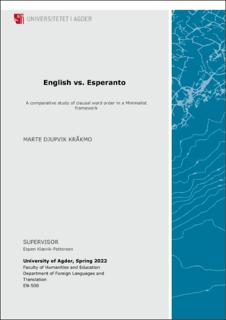| dc.description.abstract | Both English and Esperanto are international auxiliary languages, but English is deemed as an SVO language with rigid word order, while Esperanto, although considered predominantly SVO, allows for relatively free constituent order according to some scholars. The goal of this thesis is to determine if this is the case and identify whether this difference in constituency leniency can be attributed to parametric differences between English and Esperanto. To answer this, the thesis seeks to uncover the underlying syntactic structure of Esperanto in transitive constructions and compare it to the syntactic structure of English.
This thesis studies the order of the subject, object, and verb in both main and embedded clause types to identify potential parametric differences and analyse the patterns through the Minimalist framework, and the Principles and Parameters model.
To identify which transitive word order patterns are common in English and Esperanto corpora studies were conducted for both languages to identify the word order patterns used and how often they occurred. The English data were retrieved from the Georgetown University Multilayer corpus, while Arbobanko were used form the Esperanto data. In addition to the corpus study, a survey was conducted for the Esperanto data to test the acceptability of each word order.
My data reflect less word order variety in Esperanto than a previous study conducted by Gledhill (2000). My data does, however, reflect a greater word order variety in Esperanto than English as stated by other scholars. These differences found in word order patterns between the two languages could, however, not be accounted for by significant parametric differences. Instead, a greater variation in non-obligatory constituent movements. | |
